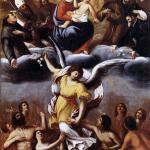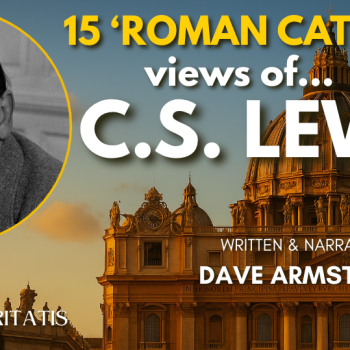
Some Protestants claim to have the “fullness of truth,” just as Catholics do.
But how does a Protestant know that? How can he be sure, since he falls back on himself, by virtue of the Protestant notion and rule of faith, of private judgment? No Protestant can know this, consistent with their own system, because they have denied the infallibility of the Church: precisely that which was designed by God to provide us with assurance that we have divinely protected fullness of truth, and infallible truth.
If the Protestant removes that, then he obviously can’t have it. It’s pretty simple when you step back and look at it. That’s why many (I’d say, most) thoughtful, informed Protestants no longer even make this claim. They say, rather, that all denominations have parts of the truth; no one has it all. It’s awfully hard to establish that, except on pure subjectivism (which is not rational).
Besides, it is obvious that Protestants contradict each other all over the place, so who’s to say which is right on what? They haven’t been able to resolve that thorny problem in almost 500 years.
The so-called Protestant “reformers” claimed to be going back to the Bible and the teachings of the early Church, in order to overcome the corrupt “traditions of men.” But this is quite obviously not the case, once one actually examines what was believed by the early Church. Time and again, I have amply demonstrated, in my debates, that the early Church fathers were far, far more like Catholics than like any sort of Protestant.
This whole notion of “going back” to the early Church is sheer myth: one of the greatest of the Protestant Revolt, which is what it was: it was no reform.
The only “reform” they made was in emphasizing the same stuff that Catholics historically believed, anyway, like Grace Alone, and the inspiration of Scripture. All of their distinctively Protestant innovations, like sola Scriptura or sola fide or a host of other things, were unheard of in the ancient Church.
This is the burden of every Protestant who uses this rhetoric, to explain. It can’t be done. If they try to argue it from Church history, they lose every time. I know, because I’ve been in dozens of such debates myself, with many of the leading fundamentalist Protestant debaters.
As for mere “traditions of men,” no one has more of those than Protestants. Sola Scriptura isn’t in the Bible anywhere, yet they base their entire system on it. It is itself a bald, unsubstantiated tradition of men. It was essentially invented by Martin Luther on the spur of the moment when he was trapped in debate by a Catholic opponent (Leipzig Debate of 1519). The Bible itself teaches that there are corruptions of men, but also true divine traditions.
So if one wants to truly take the Bible as the fullness of truth, that includes a positive as well as negative version of tradition. It also includes Church authority, which is related. This same Scripture teaches both church and papal infallibility.
Catholics and Protestants agree that the Bible alone is inspired. Infallibility is a far lesser gift, that protects men from promulgating error and making it binding on the faithful.
Of course we are sinners and make mistakes. Precisely because of this, the Church has to be divinely protected by the Holy Spirit from error. But Protestantism ditched that belief, and so left mere men to fend for themselves and fall back on themselves. Who wants to fall back on that weak reed?!
Thus, human error in relation to doctrine is far more a problem in Protestantism than in Catholicism. God always had to use sinners, even to write much of His collected inspired documents, the Bible (Moses, David, Paul, Peter: murderers, adulterers, betrayers: quite a motley group). The Bible makes it clear that there will always be sinners in the Church, too.
Protestants can claim whatever they like about possessing “fullness of truth.” That’s easy. But they can’t prove this. The Catholic, on the other hand, believes there is a divinely protected Church, established by Christ, that preserves the fullness of the apostolic deposit through apostolic succession. That’s a consistent (and patristic and biblical) view. It requires faith, sure, but it is thoroughly based both on the Bible and Church history.
The Protestant view cannot ultimately be backed up by either thing, and is unable to be consistently practiced in real life. It’s self-defeating. That can easily be demonstrated by showing that claims such as this are based on nothing when scrutinized. The Protestant needs to be challenged to explain why they believe these things based on nothing, as if Christian belief were similar to an onion that you keep peeling, but which has nothing inside.
There is no core. That’s how Protestantism is (logically speaking). Protestants retain much of what historic Catholicism taught; here I am referring specifically to the logic of their principles of authority.
The emperor is naked. I’m here to tell him that he is (which makes one highly popular!). I’ve believe I’ve successfully defended this argument in scores of times in debates. The Protestant — with all due respect — simply has no answer to these sorts of fundamental critiques.
***
(originally 9-25-08)
Photo credit: photograph by Lil Shepherd (5-16-12) [Wikimedia Commons / Creative Commons Attribution 2.0 Generic license]
***












